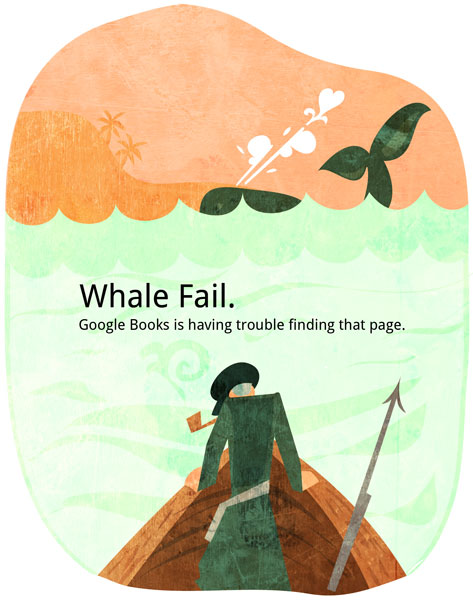Google Books is buying into the “fail whale” meme with their own. Moby Dick, ahoy!

Spotted via @ryancordell, original spotter was @ThomasRuysSmith.
Google Books is buying into the “fail whale” meme with their own. Moby Dick, ahoy!

Spotted via @ryancordell, original spotter was @ThomasRuysSmith.
Tags: fail whale, Google Books
Posted in random thoughts | Comments (0)
Douglas Knox touches on the future of “distant reading” ((What’s “distant reading”? Think “text mining of literature”–but it’s deeper than that. It’s also called the macroeconomics of literature (“macroanalysis”) and Hathi Trust taking?))
For rights management reasons and also for material engineering reasons, the research architecture will move the computation to the data. That is, the vision of the future here is not one in which major data providers give access to data in big downloadable chunks for reuse and querying in other contexts, but one in which researchers’ queries are somehow formalized in code that the data provider’s servers will run on the researcher’s behalf, presumably also producing economically sized result sets.
There are also some implicit research goals, for those in cyberinfrastructure, digital humanities support, and people in text mining aiming at supporting humanities scholars:
Whatever we mean by “computation,” that is, can’t be locked up in an interface that tightly binds computation and data. Readers already need (and for the most part do not have) our own agents and our own data, our own algorithms for testing, validating, calibrating, and recording our interaction with the black boxes of external infrastructure.
This kind of blackbox infrastructure contrasts with “using technology critically and experimentally, fiddling with knobs to see what happens, and adjusting based on what they find.” when a scholar is “free to write short scripts and see results in quick cycles of exploration”.
I’m pulling these out of context — from Douglas’ post on the Digital Humanities 2011 conference.
Tags: dh11, digital humanities, distant reading, Google Books, macroanalysis
Posted in books and reading, information ecosystem | Comments (0)
Will Google Books create a monopoly? Some ((“Several European nations, including France and Germany, have expressed concern that the proposed settlement gives Google a monopoly in content. Since the settlement was the result of a class action against Google, it applies only to Google. Other companies would not be free to digitise books under the same terms.” (bolding mine) – Nigel Kendall, Times (UK) Online, Google Book Search: why it matters )) people think ((“Google’s five-year head start and its relationships with libraries and publishers give it an effective monopoly: No competitor will be able to come after it on the same scale. Nor is technology going to lower the cost of entry. Scanning will always be an expensive, labor-intensive project.” (bolding mine) – Geoffrey Nunberg, Chronicle of Higher Education, Google’s Book Search: A Disaster for Scholars (pardon the paywall))) so. Brin claims it won’t:
If Google Books is successful, others will follow. And they will have an easier path: this agreement creates a books rights registry that will encourage rights holders to come forward and will provide a convenient way for other projects to obtain permissions.
-Sergey Brin, New York Times, A Library To Last Forever
Brin is wrong: the proposed Google Books settlement will not smooth the way for other digitization projects. It creates a red carpet for Google while leaving everyone else at risk of copyright infringement.
The safe harbor provisions apply only to Google. Anyone else who wants to use one of these books would face the draconian penalties of statutory copyright infringement if it turned out the book was actually still copyrighted. Even with all this effort, one will not be able to say with certainty that a book is in the public domain. To do that would require a legislative change – and not a negotiated settlement.
– Peter Hirtle, LibraryLawBlog: The Google Book Settlement and the Public Domain.
Monopoly is not the only risk. Others include ((Of course there are lots of benefits, too!)) reader privacy, access to culture, suitability for bulk and some research users (metadata, etc.). Too bad Brin isn’t acknowledging that!
Don’t know what all the fuss is with Google Books and the proposed settlement? Wired has a good outline from April.
Tags: business models, digitization, fair use, Google Books, orphan works
Posted in books and reading, future of publishing, information ecosystem, intellectual freedom, library and information science | Comments (1)